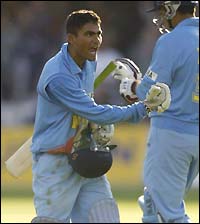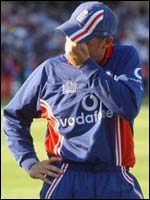A one-dayer to treasure
Daniel Laidlaw
For sheer emotion, it was a one-day international to savour for the ages.
The sensational throwing off and crushing of the monkey on the back in the
form of the 0-for-9 finals record, captain Sourav Gangulyís pricelessly
emotional celebrations, inscrutable youngster Mohammad Kaifís nerveless
temperament and the records shattered, all made it a triumph for India to
treasure. As a spectacle, it was surely one of the greatest ODIs ever. But
it was the depth of feeling displayed by the Indian team that will linger in
the memory most.
They were seemingly finished, rallied, finished off again and then revived
by two young batsmen who knew no fear, the meaning of defeat nor the odds
stacked against them.
 At 146/5, chasing a distant 326, it should realistically have been all over.
Ganguly and Sehwag tried, but after the characterless effort with the ball,
loss of wickets chasing a total of that magnitude was inevitable. A flying
start was necessary, but partnership building was always required that would
see the run-rate deflate, with the batsmen still having to keep it high
enough to be within range with wickets in hand towards the end. The pressure
of that tightrope proved intolerable; the mistakes seemingly fatal.
At 146/5, chasing a distant 326, it should realistically have been all over.
Ganguly and Sehwag tried, but after the characterless effort with the ball,
loss of wickets chasing a total of that magnitude was inevitable. A flying
start was necessary, but partnership building was always required that would
see the run-rate deflate, with the batsmen still having to keep it high
enough to be within range with wickets in hand towards the end. The pressure
of that tightrope proved intolerable; the mistakes seemingly fatal.
But the confidence of youth meant Yuvraj Singh and Mohammad Kaif did not
know when they were beaten. They refused to submit and did not lose sight of
the objective, managing the difficult juxtaposition of sustaining a
partnership while keeping a healthy enough run rate to stay just within
theoretical range. Never mind that half the side was out with only the tail
to come.
Until the Yuvraj-Kaif partnership, just about everything had been against
India. The pattern was to some degree set when England scored more runs than
the quality of Khan and Nehraís bowling should have allowed in the initial
overs. Three half-chances were not taken, Hussain batted streakily, and
still Englandís progress was threatening.
 The key moment appeared to arrive when Trescothick swept Harbhajan for four
and six in consecutive balls. Harbhajan was beginning to rein in Englandís
momentum, and with persistence the state of the game could have been
rectified. But when Hussain also signalled he was prepared to take risks to
get his innings going and survived, Indiaís outlook gradually changed for
the worse.
The key moment appeared to arrive when Trescothick swept Harbhajan for four
and six in consecutive balls. Harbhajan was beginning to rein in Englandís
momentum, and with persistence the state of the game could have been
rectified. But when Hussain also signalled he was prepared to take risks to
get his innings going and survived, Indiaís outlook gradually changed for
the worse.
It was at this point that character was needed; something had to be
manufactured to break the batsmenís rhythm. The way Trescothick, and to a
greater extent Hussain, played the spinners, sweeping and reverse sweeping
almost compulsively, indicated it was the right move to pick both Harbhajan
and Kumble. But they needed to *bowl* like spinners, with flight and belief,
and they didnít. They were too passive, Harbhajan reduced to firing the ball
through and Kumble serving up inconsistency.
Destiny was seemingly conspiring against India, but it was fully abetted by
the indifferent bowling. It was uninspired stuff, particularly given that
one of the batsmen, Hussain, hardly hit a ball in the middle of the bat.
After 30 overs, the range of the total was effectively determined, and the
rest was a case of going through the motions and limiting the damage.
Averaging 14 in the preliminaries, the enormity of the task facing India
appeared to inspire some fully committed risk-taking by Ganguly. Lacerating
the off-side boundary, Ganguly eclipsed his more explosive partner and
showed why it was still the right move to keep Tendulkar in reserve.
The spectacular start was what was required, but the difficult part was
always ahead. With the field back, the run rate required had to increase,
yet the batsmen could not be overly concerned with it, needing to keep
wickets in hand for the natural surge at the end. It would have been
suicidal to attempt to maintain seven per over.
Still, Ganguly erred in hitting across the line; Mongia and Dravid were
essentially strangled out by Irani, and when Tendulkar was somewhat
fatalistically bowled, stepping away slashing at Giles (the experience of the
veteran seemed to tell him the cause was hopeless, and to play accordingly),
0-for-10 seemed a certainty.
That only appeared to change sometime between overs 35-40, when the belief
started to come back. As well as the familiar power of Yuvrajís strokes, it
was hard not to be struck by the confidence and technique of Kaif. Whatever
else, he looked a mature Test batsman, and the character so sorely missing
in the bowling was finally displayed by the pair.
Remarkably, about fifty runs out, for the first time one would have said
that victory was Indiaís for the taking. It was evident that Yuvraj could
feel it, which made his dismissal against Collingwood all the more
excruciating. If India had lost, one suspects he would still be shaking his
head and feeling responsible.
Responsibility was exactly what Harbhajan and Kumble dreadfully failed to
show in support of Kaif. With the impassive Kaif only needing the strike,
Harbhajanís and Kumbleís recklessness in facing Flintoff was inexcusable,
even if the leg-spinner didnít hit it. Fortunately, it did not undermine the
hard work of Yuvraj and Kaif and prevent the sensational triumph. Protect
Kaif from the hype, and get this man a Test career!
Finally, if you did not love the spontaneously emotional celebration of
Sourav Ganguly then something must be wrong with the spirit in which cricket
is watched. This is a captain who clearly loves his team and cares deeply
about its performance. The shirt-waving, flag-waving and leaping embrace of
Kaif had to be heartfelt and was wonderful to see. Ganguly may have taken a
lot of criticism but for this he deserves only appreciative kudos.
More Columns
Mail Daniel Laidlaw